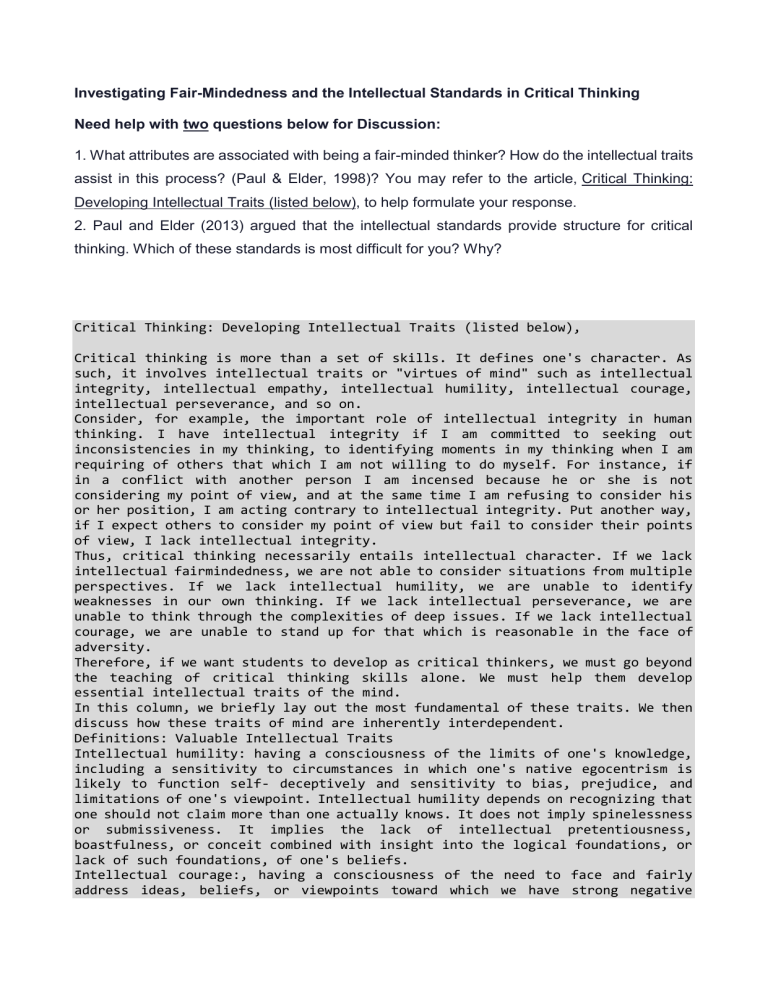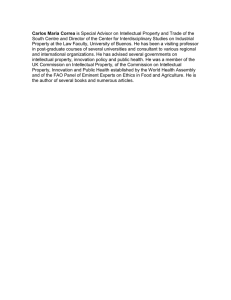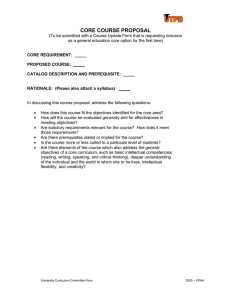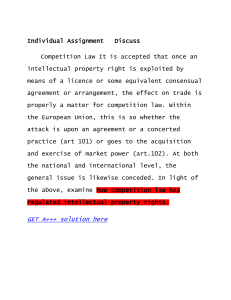Investigating Fair-Mindedness and the Intellectual Standards in Critical Thinking (Social Psycology)
advertisement

Investigating Fair-Mindedness and the Intellectual Standards in Critical Thinking Need help with two questions below for Discussion: 1. What attributes are associated with being a fair-minded thinker? How do the intellectual traits assist in this process? (Paul & Elder, 1998)? You may refer to the article, Critical Thinking: Developing Intellectual Traits (listed below), to help formulate your response. 2. Paul and Elder (2013) argued that the intellectual standards provide structure for critical thinking. Which of these standards is most difficult for you? Why? Critical Thinking: Developing Intellectual Traits (listed below), Critical thinking is more than a set of skills. It defines one's character. As such, it involves intellectual traits or "virtues of mind" such as intellectual integrity, intellectual empathy, intellectual humility, intellectual courage, intellectual perseverance, and so on. Consider, for example, the important role of intellectual integrity in human thinking. I have intellectual integrity if I am committed to seeking out inconsistencies in my thinking, to identifying moments in my thinking when I am requiring of others that which I am not willing to do myself. For instance, if in a conflict with another person I am incensed because he or she is not considering my point of view, and at the same time I am refusing to consider his or her position, I am acting contrary to intellectual integrity. Put another way, if I expect others to consider my point of view but fail to consider their points of view, I lack intellectual integrity. Thus, critical thinking necessarily entails intellectual character. If we lack intellectual fairmindedness, we are not able to consider situations from multiple perspectives. If we lack intellectual humility, we are unable to identify weaknesses in our own thinking. If we lack intellectual perseverance, we are unable to think through the complexities of deep issues. If we lack intellectual courage, we are unable to stand up for that which is reasonable in the face of adversity. Therefore, if we want students to develop as critical thinkers, we must go beyond the teaching of critical thinking skills alone. We must help them develop essential intellectual traits of the mind. In this column, we briefly lay out the most fundamental of these traits. We then discuss how these traits of mind are inherently interdependent. Definitions: Valuable Intellectual Traits Intellectual humility: having a consciousness of the limits of one's knowledge, including a sensitivity to circumstances in which one's native egocentrism is likely to function self- deceptively and sensitivity to bias, prejudice, and limitations of one's viewpoint. Intellectual humility depends on recognizing that one should not claim more than one actually knows. It does not imply spinelessness or submissiveness. It implies the lack of intellectual pretentiousness, boastfulness, or conceit combined with insight into the logical foundations, or lack of such foundations, of one's beliefs. Intellectual courage:, having a consciousness of the need to face and fairly address ideas, beliefs, or viewpoints toward which we have strong negative emotions and to which we have not given a serious hearing. This courage is connected with the recognition that ideas considered dangerous or absurd are sometimes rationally justified (in whole or in part) and that conclusions and beliefs inculcated in us are sometimes false or misleading. To determine for ourselves which is which, we must not passively and uncritically accept what we have learned. Intellectual courage comes into play here because, inevitably, we will come to see grains of truth in some ideas considered dangerous and absurd and distortion or falsity in some ideas strongly held in our social group. We need courage to be true to our own thinking in such circumstances. The penalties for nonconformity can be severe. Intellectual empathy: having a consciousness of the need to imaginatively put oneself in the place of others in order to genuinely understand them, which requires the consciousness of our egocentric tendency to identify truth with our immediate perceptions of long-standing thought or belief. This trait correlates with the ability to reconstruct accurately the viewpoints and reasoning of others and to reason from premises, assumptions, and ideas other than our own. This trait also correlates with the willingness to remember occasions when we were wrong in the past despite an intense conviction that we were right and with the ability to imagine our being similarly deceived in a caseat-hand. Intellectual integrity: recognition of the need to be true to one's own thinking, to be consistent in the intellectual standards one applies, to hold oneself to the same rigorous standards of evidence and proof to which one holds one's antagonists, to practice what one advocates for others, and to honestly admit discrepancies and inconsistencies in one's own thought and action. Intellectual perseverance having a consciousness of the need to use intellectual insights and truths in spite of difficulties, obstacles, and frustrations; firm adherence to rational principles despite the irrational opposition of others; and a sense of the need to struggle with confusion and unsettled questions over an extended period of time to achieve deeper understanding or insight. Faith in reason: confidence that, in the long run, one's own higher interests and those of humankind at large will be best served by giving the freest play to reason and by encouraging people to come to their own conclusions through developing their own rational faculties. It also includes faith that, with proper encouragement and cultivation, people can learn to think for themselves, to form rational viewpoints to draw reasonable conclusions, to think coherently and logically, and to persuade each other by reason and become reasonable persons despite the deep-seated obstacles in the native character of the human mind and in society as we know it. Fairmindedness: having a consciousness of the need to treat all viewpoints alike, without reference to one's own feelings or vested interests or the feelings or vested interests of one's friends, community, or nation. The term implies adherence to intellectual standards without reference to one's own advantage or the advantage of one's group. The Interdependence of Traits of Mind The traits of mind essential for critical thinking are interdependent. Consider intellectual humility. To become aware of the limits of our knowledge, we need the courage to face our own prejudices and ignorance. To discover our own prejudices, in turn, we often must empathize with and reason within points of view toward which we are hostile. To achieve this end, we must typically persevere over a period of time, for learning to empathetically enter a point of view against which we are biased takes time and significant effort. That effort will not seem justified unless we have sufficient confidence in reason to believe we will not be "tainted" or "taken in" by whatever is false or misleading in the opposing viewpoint. Furthermore, merely believing we can survive serious consideration of an "alien" point of view is not enough to motivate most of us to consider one seriously. We must also be motivated by an intellectual sense of justice. We must recognize an intellectual responsibility to be fair to views we oppose. We must feel obliged to hear them in their strongest form to ensure that we are not condemning them out of ignorance or bias on our part. At this point, we come full circle back to where we began: the need for intellectual humility. To begin at another point, consider intellectual good faith or integrity. Intellectual integrity is clearly a difficult trait to develop. We are often motivated, generally without admitting to or being aware of this motivation, to set up inconsistent intellectual standards. Our egocentric or sociocentric tendencies make us ready to believe positive information about those we like, and negative information about those we dislike. We are likewise strongly inclined to believe what serves to justify our vested interest or to validate our strongest desires. Hence, all humans have some innate mental tendencies to operate with double standards, which of course is paradigmatic of intellectual bad faith. Such modes of thinking often correlate quite well with getting ahead in the world, maximizing our power or advantage, and getting more of what we want. Nevertheless, it is difficult to operate explicitly or overtly with a double standard. We therefore need to avoid looking at the evidence too closely. We need to avoid scrutinizing our own inferences and interpretations too carefully. At this point, a certain amount of intellectual arrogance is quite useful. I may assume, for example, that I know just what you're going to say (before you say it), precisely what you are really after (before the evidence demonstrates it), and what actually is going on (before I have studied the situation carefully). My intellectual arrogance may make it easier for me to avoid noticing the unjustifiable discrepancy between the standards I apply to you and the standards I apply to myself. Of course, if I don't have to empathize with you, that too makes it easier to avoid seeing my duplicity. I am also better positioned if I lack a keen need to be fair to your point of view. A little background fear of what I might discover if I seriously considered the consistency of my own judgments can be quite useful as well. In the example case, my lack of intellectual integrity is supported by my lack of intellectual humility, empathy, and fairmindedness. Going in the other direction, it will be difficult to use a double standard if I feel a responsibility to be fair to your point of view, see that this responsibility requires me to view things from your perspective empathetically, and behave with some humility, recognizing I could be wrong and you right. The more I dislike you personally, or feel wronged in the past by you or by others who share your way of thinking, the more pronounced in my character the traits of intellectual integrity and good faith must be to compel me to be fair. Conclusion To effectively teach critical thinking, we must introduce students to the intellectual traits. We must help them understand that critical thinking is a pervasive way of being, that it means continually probing and assessing our thinking in the pursuit of developing our intellectual character. It means developing a questioning inner voice which strengthens our character, by routinely asking such questions as: Below is description: The Paul and Elder - Critical Thinking: Developing Intellectual Traits. Answer What attributes are associated with being a fair-minded thinker? How do the intellectual traits assist in this process? -"Virtues of Mind" or Intellectual traits are attributes that are associated with being a fair-minded thinker. Intellectual integrity Intellectual Empathy Intellectual humility Intellectual courage Intellectual perseverance -Each intellectual trait is interdependent on each other to attain a well -balanced process of critical thinking. We must understand that critical thinking is a pervasive way of being, that it means continually probing and assessing our thinking in the pursuit of developing our intellectual character. It means developing a questioning inner voice which strengthens our character. Paul and Elder (2013) argued that the intellectual standards provide structure for critical thinking. Which of these standards is most difficult for you? Why? Intellectual Integrity is the most difficult among the intellectual traits for critical thinking. It is for the reason that if my intellectual integrity is somehow different to others, I may be judged as a person with lack of intellectual humility, empathy and fairmindedness. At worst, I will be called indifferent and unjust person if my intellectual integrity is far differ from the norm. The Intellectual traits have the following characteristics that assist in the process of critical thinking: Intellectual integrity- It is the recognition of the need to be true to one's own thinking, to be consistent in the intellectual standards one applies, to hold oneself to the same rigorous standards of evidence and proof to which one holds one's antagonists, to practice what one advocates for others, and to honestly admit discrepancies and inconsistencies in one's own thought and action. Intellectual Empathy-This trait correlates with the ability to reconstruct accurately the viewpoints and reasoning of others and to reason from premises, assumptions, and ideas other than our own. This trait also correlates with the willingness to remember occasions when we were wrong in the past despite an intense conviction that we were right and with the ability to imagine our being similarly deceived in a caseat-hand. Intellectual humility- It depends on recognizing that one should not claim more than one actually knows. It does not imply spinelessness or submissiveness. It implies the lack of intellectual pretentiousness, boastfulness, or conceit combined with insight into the logical foundations, or lack of such foundations, of one's beliefs. Intellectual courage-This courage is connected with the recognition that ideas considered dangerous or absurd are sometimes rationally justified (in whole or in part) and that conclusions and beliefs inculcated in us are sometimes false or misleading. To determine for ourselves which is which, we must not passively and uncritically accept what we have learned. Intellectual courage comes into play here because, inevitably, we will come to see grains of truth in some ideas considered dangerous and absurd and distortion or falsity in some ideas strongly held in our social group. We need courage to be true to our own thinking in such circumstances. The penalties for nonconformity can be severe. Intellectual perseverance- Is the trait of having a consciousness of the need to use intellectual insights and truths in spite of difficulties, obstacles, and frustrations; firm adherence to rational principles despite the irrational opposition of others; and a sense of the need to struggle with confusion and unsettled questions over an extended period of time to achieve deeper understanding or insight. Intellectual integrity is clearly a difficult trait to develop. We are often motivated, generally without admitting to or being aware of this motivation, to set up inconsistent intellectual standards. Our egocentric or sociocentric tendencies make us ready to believe positive information about those we like, and negative information about those we dislike. We are likewise strongly inclined to believe what serves to justify our vested interest or to validate our strongest desires. Hence, all humans have some innate mental tendencies to operate with double standards, which of course is paradigmatic of intellectual bad faith. Such modes of thinking often correlate quite well with getting ahead in the world, maximizing our power or advantage, and getting more of what we want.






